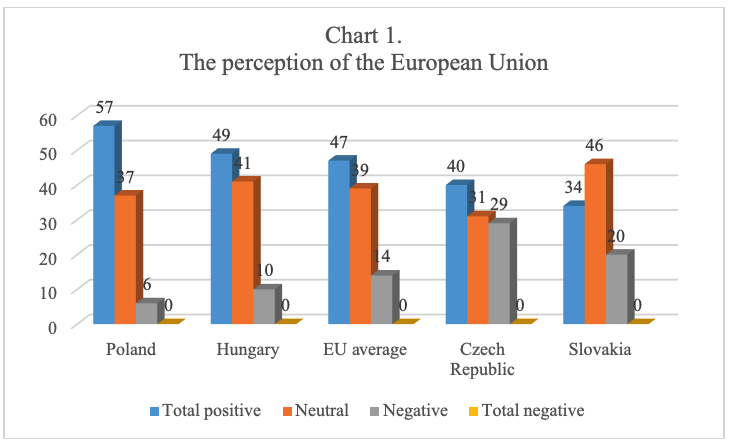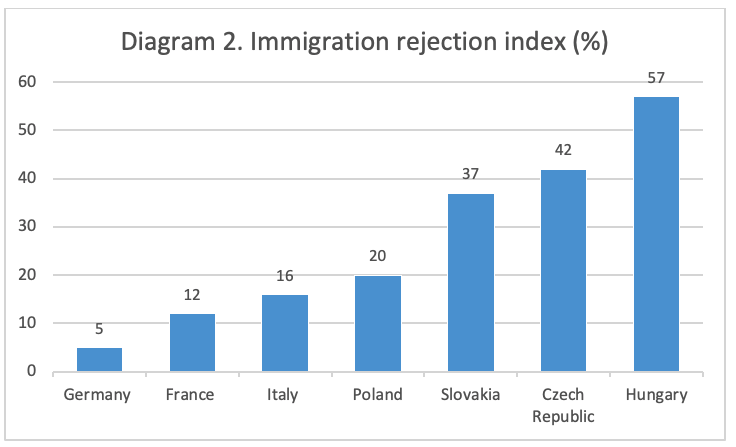Weekly Briefing, Vol. 38, No. 3 (HU), March 2021
The Hungarian concept of the EU
Summary
Traditional values are often contrasted with the prospect of more Europe, the progress of European integration. However, progress of the European Union does not necessarily mean weaker states. The Hungarian concept of the EU is about deep cooperation between strong states who can rely on their resources and shape their future. In other words, Hungarians support a strong European Union, but they support a different European Union than the citizens of Western Europe. Recent polling data and attitudinal analyses confirm this statement. The meaning is relevant when assessing future EU debates.
Introduction
The global pandemic and tectonic shifts in the world order raise the question of how Hungarian society responds to these challenges and how its concept of the EU might change along with other shifts. Given the socio-economic differences between the Visegrad countries and the six founding countries of the EU, further differences may also arise regarding the future of the continent. This briefing explores the questions based on comprehensive surveys and attempts to draw conclusions for foreign- and EU policy in Hungary.
Hungarians about the European Union
The latest edition of the Eurobarometer, titled “Future of Europe”, was published in February 2021, and the survey fieldwork was carried out in October and November 2020. Hungarians’ assessment of the EU is slightly more positive than the EU average. With this result, Hungarians are neither overly negative nor very positive compared to the other Visegrad countries. (See chart 1!) The finding may surprise those who try to describe that strong nationalism within Hungary is reflected in the rejection of the European Union and European values. However, this is not the case.

Source: own diagram based on Eurobarometer: Future of Europe. p. 10, https://www.europarl.europa.eu/at-your-service/files/be-heard/eurobarometer/2021/future-of-europe-2021/en-report.pdf
Looking at the evolution of the EU image, 16 percent of Hungarians said that their image of the EU has deteriorated in the last 6 months, while both the EU average (26 percent) and other Visegrad countries had higher scores on this question (Poland: 22 percent, Czech Republic: 29 percent, Slovakia: 28 percent). In other words, we can conclude that Hungarians have not turned away from European solutions and the EU itself.
At this point, one might conclude that Hungarians are more positive than average because they do not follow the changes in the EU political and economic environment so closely. However, this is not the case, as 80 percent of Hungarians said that the Coronavirus crisis made them think about the future of the European Union. This figure is significantly higher than the EU average (70 percent) and the results of the other Visegrad countries (Poland: 62 percent, Czech Republic: 67 percent, Slovakia: 70 percent).
We can conclude that Hungarians are not only more supportive than the EU average, but are also aware of recent changes. At the same time, we can also add that the positive future scenario is not limited to the EU but can be understood as a broader and more fundamental belief in the future based on the economic performance of these Visegrad countries in recent years.
Századvég Group published the latest result of its ‘Project Europe’ survey, which started in 2016, covers 28 countries and interviews 28 000 people in EU member states. The citizens of the United Kingdom, Norway, and Switzerland were also included in this survey, i.e., 30 000 people. The result: the citizens of the Visegrad countries are more positive when it comes to the standard of living for the next generation. While 37 percent in the V4 countries said that the next generation will have a better quality of life, only 18 percent of the “old EU-15” agreed with this statement. Hungarians are again the most optimistic (42 percent) and Polish citizens are also very positive about the future (40 percent).
So the general conclusion from this poll is that Hungarians are more supportive of the EU, believe in the future, and are more up to date with changes in the world than the EU average. This conclusion is in sharp contrast to the image of Hungarians in Western media. We can also conclude that the argument that Hungary will leave the European Union and that the Hungarian leadership is preparing for this is also entirely flawed.
| Table 1. Answers to the question “What do you think your children or the next generation will live …? (percent) | ||||
| … better living than today | … the same way as today | … worse than today | … does not know or give a response | |
| EU27+UK | 23 | 25 | 42 | 10 |
| ‘Old EU15’* | 18 | 26 | 45 | 11 |
| V4 countries | 37 | 21 | 31 | 11 |
| Source: Századvég Group, Project Europe, 2021. * France, Germany, Italy, Belgium, Luxembourg, Netherlands, Sweden, Finland, Austria, Greece, Portugal, Spain, Ireland, Denmark, and the United Kingdom | ||||
Hungarians about values
At the same time, for the majority of Hungarians, supporting the EU does not mean abandoning traditional values. A good case study is the attitude towards migration. This is another issue where we can see that similar opinions can be seen across the whole region, namely people’s opinion on migration. The general attitude is negative towards the EU solutions’ to migration. And this is what distinguishes the V4 countries from Western Europe.
The most comprehensive data can be found in the European Social Survey, the 2018-2019 survey data was granted at the end of last year. According to the results, Hungarians have the most negative attitude towards immigration. The rejection index of immigration in Hungary is 57 (the index ranges from 0 to 100; the higher the number, the stronger the rejection of migration). The indices of the other Visegrad countries are also high when compared with those of the Western European countries, where the rejection rate is much lower.
In this aspect, we should not forget the different historical experiences of these countries. In their history, these countries and nations were often under the threat of “disappearing from the stage of history”. And we can add that the decades between 1990 and now has not prepared these societies to accept more social homogeneity, while in Western Europe the permanent influx of immigrants into these countries over decades has created a different attitude towards migration.

Source: based on Messing and Sárvári:
Cementing European Divisions – Mapping European Attitudes toward Migration, 2020.
Similar conclusions are drawn from Századvég’s survey, which was made from a different angle. The poll asked respondents whether they agreed with the EU’s proposal to introduce a mandatory quota system for the distribution of migration. Only 20 percent of respondents in the V4 countries agreed with this statement, while in the “old member states”, [1]the agreement with the proposal was 59 percent. However, 78 percent of V4 citizens agreed with the statement that countries should rely on internal resources and support local families rather than immigration. In the ‘old member states’, this figure was 65 percent.
Traditional values seem to be more supported in the four Visegrád countries, which statement can be supported by the answers to the question of whether the preservation of Christian values is also important. 59 percent of V4 citizens found this important. For the ‘old member states’ it was only 53 percent.
Support of traditional values and the European Union
The question of how to reconcile the seemingly strong contradiction between the advocacy of traditional values and the European project in the case of Hungary arises. It is often argued that Hungarians support EU membership because of the economic benefits (EU transfers, free movement in the Schengen area, etc.), therefore the citizens would see more Brussels-like behavior and actions from the Hungarian government.
However, this argument is deeply flawed. We can understand this by looking at how citizens of the V4 countries respond to the question of whether member states should have more power over the European Union. 54 percent in the V4 countries agreed with this statement, compared to only 46 percent within the “old member states.”
From this answer, it can be concluded that the citizens of the Visegrad countries support the European Union, but they support a different European Union than the people in Western Europe. Strong support of the EU project and protection of traditional and national values are not contradictory, moreover it is the only way to strengthen the European Union. Therefore, the higher rejection of migration index is rather due to a different EU perception than to negative nationalistic ideas.
Conclusion
We could see in the analysis that commitment to European Union membership and the protection of traditional values of society are not in conflict. Furthermore, this is probably the only way to strengthen European Union. The conclusion that Hungarian policymakers can draw from the survey data is that the majority of Hungarian society supports traditional values and also the EU, so Hungary faces an uphill battle if it wants to preserve these two elements.
[1] France, Germany, Italy, Belgium, Luxembourg, Netherlands, Sweden, Finland, Austria, Greece, Portugal, Spain, Ireland, Denmark, and the United Kingdom
